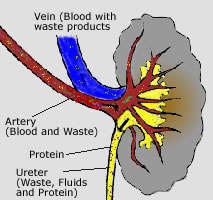Nephrotic Syndrome Pathology
Nephrotic Syndrome starts when disease-fighting proteins called antibodies become deposited along the wall of the delicate blood vessels that comprise the glomeruli. Antibodies are made by the immune system to fight microorganisms such as bacteria and viruses or other agents that can cause disease. Collectively all these agents, which make body form antibodies against them, are called as antigen. The exquisite sensitivity of the immune system to these foreign molecules provides an effective defense against invasion of the body by foreign material.
In some cases, however, the immune system is activated inappropriately in response to antigens that may not have potential to cause disease. These immune hypersensitivities are called allergies. When antibodies encounter and bind to antigens in the circulation, they may form very large complexes that have difficulty staying dissolved in the blood.
 These complexes may fall out of solution in the glomeruli and become lodged in the small pores where the blood is filtered. When antigen-antibody complexes are deposited in the glomeruli, the body responds by mounting an inflammatory response to try to remove them. Ultimately, the inflammation can cause even more damage and impair the function of the glomeruli, leading to Nephrotic Syndrome
These complexes may fall out of solution in the glomeruli and become lodged in the small pores where the blood is filtered. When antigen-antibody complexes are deposited in the glomeruli, the body responds by mounting an inflammatory response to try to remove them. Ultimately, the inflammation can cause even more damage and impair the function of the glomeruli, leading to Nephrotic Syndrome
Written & Approved by-
Dr. Rajesh Shah
M.D. (Hom.)